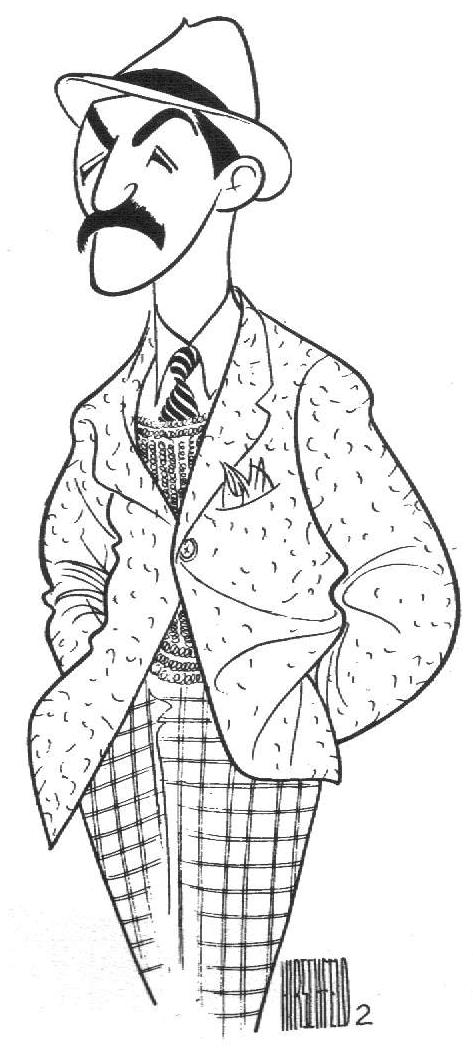Nathanael West (October 17, 1903 - December 22, 1940)
 Begun in 1937, the year the Marijuana Tax Act passed Congress, Nathanael West's acclaimed Hollywood novel The Day of the Locust has its character Faye Greener sing five verses of the Stuff Smith tune "If You're a Viper" (aka Fats Waller's 1934 "Viper's Drag") just before she sleeps with a mysterious Mexican (her dealer?):
Begun in 1937, the year the Marijuana Tax Act passed Congress, Nathanael West's acclaimed Hollywood novel The Day of the Locust has its character Faye Greener sing five verses of the Stuff Smith tune "If You're a Viper" (aka Fats Waller's 1934 "Viper's Drag") just before she sleeps with a mysterious Mexican (her dealer?):
I'm the queen of everything
Got to get high before I can swing...
The first song Faye sings is Johnny Mercer's "Jeepers Creepers," recorded by VIP Louis Armstrong:
Jeepers, creepers....where'd ya get them peepers
Jeepers, creepers...where'd ya get those eyes
Gosh oh, git up....how'd they get so lit up
Gosh oh, gee oh....how'd they get that size
Golly gee...when you turn them heaters on
Woe is me...got to put my cheaters on
Jeepers, creepers....where'd ya get them peepers
Oh, those weepers....how they hypnotize
"Where'd you get those eyes" might just have been 1930s vernacular for "What have you been smoking?" (The song's author Johnny Mercer once threw Robert Mitchum out of his house for smoking pot.)
Locust was originally titled "The Cheated." West wrote to his editor Bennett Cerf, "Do you like 'THE CHEATED?' ....I rather like "THE GRASS EATERS." Quite a few intelligent people agree on that one."
West's thinly disguised autobiographical character, Tod Hackett, is a painter working at a film studio and also on his pet project, a painting titled "The Burning of Los Angeles." He calls himself an unwilling prophet of doom, a Jeremiah. In the bible, Jeremiah is chosen by God to potend horrific disasters for Jerusalem because the people are burning incense to the wrong gods, namely the goddess Baal, the queen of heaven.
Jeremiah 51:14 says (in one translation): "The LORD Almighty has sworn by himself: I will surely fill you with men, as with a swarm of locusts, and they will shout in triumph over you" (also translated as "where once there were people as thick as locusts..."). Nebuchadnezzar, the Babylonian king (605-562 BCE) and "Grass Eater" from the bible, is mentioned throughout Jeremiah. (In his 1903 book, Evidence of the Hashish Vice in the Old Testament, Dr. C. Creighton points out the Arabian word for "grass" was the same as the word for "cannabis.")
Locust ends in a riot at Kahn's Persian Palace Theatre, under a sign "Mr. Kahn a Pleasure Dome Decreed." Not only was marjuana known as an Oriental, as well as a Mexican, pleasure at the time, but Samuel Taylor Coleridge's poem "Kubla Khan" was, according to Coleridge, inspired by a medicinal dose of opium.
Born Nathan Weinstein, Nathanael West read Tolstoy at age ten; by thirteen, he had read Turgenev, Dostoyevsky, Chekhov, Thackeray, Dickens, Shakespeare, Hardy, Balzac and De Maupassant -- and he trained his bull terrier to bite anyone who came into his room while he was reading. At Brown University (where the library is named for VIP John Hay), his Jewishness made him ineligible for a fraternity, so he joined a club called The Bacchanalians instead. While in college, West "dabbled in mysticism, ritual magic, and medieval Catholicism" and "was equally devoted to Baudelaire, Verlaine, and Rimbaud." (Source: Stanley Edgar Hyman in "Pamphlets of American Writers: Nathanael West," University of Minnesota 1962).
His first book, The Dream Life of Balso Snell, begins with a quote from VIP Marcel Proust's character Bergotte, "After all, my dear fellow, life, Anaxagoras has said, is a journey." Graham Robb writes in an October 19, 2006 New York Review of Books article on Richard Davenport-Hines's Proust at the Majestic: "Marcel Proust's character Bergotte's sampling of narcotics is described in La Prisoniere as a sexual adventure combined with a voyage of discovery: One absorbs the new product...with delicious anticipation of the unknown. The heart pounds as it does on one's first meeting with a lover....By what strange paths, up to what peaks and into what unexplored abysses will the omnipotent master lead us? What new series of senstions will we discover on this journey?"
Balso is a fantastic journey dedicated to Alice Shepherd, a woman West dated who was a classmate of his sister Laura (the wife of Marx brothers writer S.J. Perelman). In 1940, West married Eileen McKenney, the subject of Ruth McKenney's play "My Sister Eileen." The couple died in December of that year in a car accident near El Centro, California, returning from a trip to Mexico.